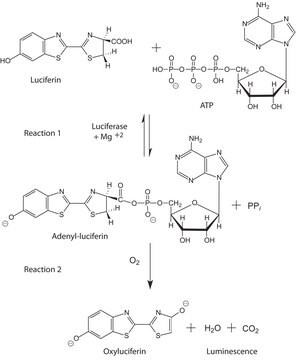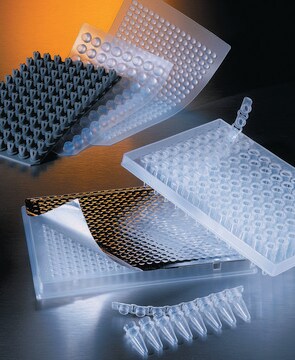3013
Transcreener® ADP2 FI Assay
Sinônimo(s):
ADP Assay Kit, Transcreener ADP Assay
Faça loginpara ver os preços organizacionais e de contrato
About This Item
Código UNSPSC:
41122100
NACRES:
NA.84
Produtos recomendados
Condições de expedição
dry ice
temperatura de armazenamento
−20°C
Descrição geral
The Transcreener® HTS Assay platform overcomes the need for time-consuming, one-off assay development for individual members within a group transfer enzyme family by utilizing a single set of assay reagents that detect an invariant product. The generic nature of the Transcreener® HTS Assay platform eliminates delays involved in assay development for new HTS targets, and greatly simplifies compound and inhibitor profiling across multiple target families.
The Transcreener® ADP2 fluorescent intensity (FI) assay extends the Transcreener® platform for ADP detection by utilizing a simple fluorescent intensity output which can be used on both fluorescence readers typically found in academic and therapeutic research labs as well as more complex multimode plate readers more commonly used in core facilities and HTS labs. The Transcreener® ADP2 FI Assay is a red, competitive fluorescence intensity (FI) assay based on the detection of ADP and therefore is compatible with any enzyme class that produces ADP, including protein, lipid, and carbohydrate kinases, ATPases, DNA helicases, carboxylases and glutamine synthetase. The Transcreener® ADP2 Assay is a simple one step homogenous detection assay, and is flexible with regard to ATP concentration (0.1 to 100 μM ATP). The assay provides excellent signal at low substrate conversion, with a Z′ = 0.7 at 2.5% ATP conversion using 1 μM ATP.
The Transcreener® ADP2 FI Assay was developed to follow the progress of any enzyme that produces ADP. The Transcreener® ADP Detection Mixture comprises a quenched ADP Alexa594 Tracer bound to the ADP2 monoclonal antibody conjugated to an IRDye® QC-1 quencher licensed from LI-COR®. The tracer is displaced by ADP, the invariant product generated during an enzyme reaction. The displaced tracer becomes un-quenched in solution leading to a positive increase in fluorescence intensity. Therefore, ADP production is proportional to an increase in fluorescence. The red tracer minimizes interference from fluorescent compounds and light scattering.
View full Transcreener® product list
The Transcreener® ADP2 fluorescent intensity (FI) assay extends the Transcreener® platform for ADP detection by utilizing a simple fluorescent intensity output which can be used on both fluorescence readers typically found in academic and therapeutic research labs as well as more complex multimode plate readers more commonly used in core facilities and HTS labs. The Transcreener® ADP2 FI Assay is a red, competitive fluorescence intensity (FI) assay based on the detection of ADP and therefore is compatible with any enzyme class that produces ADP, including protein, lipid, and carbohydrate kinases, ATPases, DNA helicases, carboxylases and glutamine synthetase. The Transcreener® ADP2 Assay is a simple one step homogenous detection assay, and is flexible with regard to ATP concentration (0.1 to 100 μM ATP). The assay provides excellent signal at low substrate conversion, with a Z′ = 0.7 at 2.5% ATP conversion using 1 μM ATP.
The Transcreener® ADP2 FI Assay was developed to follow the progress of any enzyme that produces ADP. The Transcreener® ADP Detection Mixture comprises a quenched ADP Alexa594 Tracer bound to the ADP2 monoclonal antibody conjugated to an IRDye® QC-1 quencher licensed from LI-COR®. The tracer is displaced by ADP, the invariant product generated during an enzyme reaction. The displaced tracer becomes un-quenched in solution leading to a positive increase in fluorescence intensity. Therefore, ADP production is proportional to an increase in fluorescence. The red tracer minimizes interference from fluorescent compounds and light scattering.
View full Transcreener® product list
Quantidade
3013-A = 200 assay, 96-well
3013-1K = 1,000 assay, 384-well
3013-10K = 10,000 assay, 384-well
3013-1K = 1,000 assay, 384-well
3013-10K = 10,000 assay, 384-well
forma física
Kit with buffered aqueous solutions
Informações legais
IRDye is a registered trademark of LI-COR, Inc.
LI-COR is a registered trademark of LI-COR, Inc.
Transcreener is a registered trademark of BellBrook Labs
Palavra indicadora
Warning
Frases de perigo
Declarações de precaução
Classificações de perigo
Eye Irrit. 2
Código de classe de armazenamento
12 - Non Combustible Liquids
Classe de risco de água (WGK)
WGK 3
Ponto de fulgor (°F)
Not applicable
Ponto de fulgor (°C)
Not applicable
Escolha uma das versões mais recentes:
Certificados de análise (COA)
Lot/Batch Number
Não está vendo a versão correta?
Se precisar de uma versão específica, você pode procurar um certificado específico pelo número do lote ou da remessa.
Já possui este produto?
Encontre a documentação dos produtos que você adquiriu recentemente na biblioteca de documentos.
Sungsoon Fang et al.
Nature medicine, 21(2), 159-165 (2015-01-07)
The systemic expression of the bile acid (BA) sensor farnesoid X receptor (FXR) has led to promising new therapies targeting cholesterol metabolism, triglyceride production, hepatic steatosis and biliary cholestasis. In contrast to systemic therapy, bile acid release during a meal
H Wada et al.
Journal of bacteriology, 175(2), 544-547 (1993-01-01)
Thylakoid membranes isolated from the cyanobacterium Synechocystis sp. strain PCC6803 were capable of desaturating the acyl groups in monogalactosyl diacylglycerol. This desaturation reaction required the reduced form of ferredoxin.
Nossa equipe de cientistas tem experiência em todas as áreas de pesquisa, incluindo Life Sciences, ciência de materiais, síntese química, cromatografia, química analítica e muitas outras.
Entre em contato com a assistência técnica





